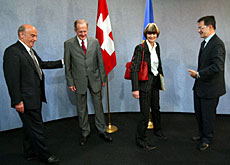
New dawn for Swiss-EU relations

Switzerland and the European Union have officially wrapped up negotiations on a second set of bilateral accords at a meeting in Brussels.
The European Commission president, Romano Prodi, hailed the agreement as a boost to Swiss-EU relations.
“The Union embraces Switzerland,” he said. “This marks the start of a new stage in our relationship.”
He added that the treaties would bring considerable advantages to people in both Switzerland and EU member states.
The Swiss president, Joseph Deiss, said Wednesday’s summit “marked the beginning of a new phase in relations in terms of both quality and intensity”.
“I am confident that Switzerland will be a solid partner for the EU in the future,” he added.
Switzerland was also represented in Brussels by Foreign Minister Micheline Calmy-Rey and Finance Minister Hans-Rudolf Merz.
During the meeting in Brussels the two sides gave their official agreement to the compromise deal, reached on May 13, in which the EU agreed to guarantee Swiss banking secrecy in exchange for Bern’s cooperation in taxing EU residents’ savings.
The nine agreements, which include closer cooperation on security and asylum, the fight against international smuggling and customs fraud, are expected to be signed in the autumn, but there are still a few hurdles to overcome.
Delays
Despite more than two years of tortuous negotiations, uncertainties remain over the Schengen accord on cross-border crime and the EU savings tax directive.
Deiss said he was optimistic Brussels could implement its plan to tax EU residents’ savings abroad even if Switzerland had not ratified the deal by January 2005.
He told a news conference that he wanted to present the agreement with the EU to parliament for approval in September or December.
However, a referendum by Swiss voters could delay final ratification.
“Given that there is a three-month timetable for referendums, it will not be possible for us definitely to be ready by January 1,” said Deiss.
“But we do think it will be possible for us to find arrangements which could make it possible for the EU to comply with its practices and its objectives,” he added.
Banking secrecy
For its part, the EU still has to finish negotiations with other external countries, especially with associated territories such as the islands of Jersey, Guernsey and the Caribbean.
These negotiations are said to be progressing but last-minute problems cannot be excluded. The EU has fixed a date of June 30 by which time it wants the directive adopted.
Before that, European ministers are set to have what is expected to be a stormy meeting on June 2 in which they will be approving two annex declarations, which are linked to the compromise deal reached with Switzerland.
The first one grants Luxembourg the same rights as Switzerland on banking secrecy; the second, put forward by five countries – France, the Netherlands, Italy, Sweden and Spain – serves to remind members that the objective of the EU savings tax directive is the exchange of information and not the deduction at source for taxes.
Ratification in Switzerland
In Switzerland, the accord most under threat is the Schengen agreement on cross-border crime.
The rightwing Swiss People’s Party has already announced its intention to hold a referendum on Schengen.
For this reason, Switzerland has been granted a two-year deadline to apply present and future legislation.
But a referendum on whether to extend the free movement of people accord to the ten new members of the EU is more risky, as it would call into question the first round of the bilateral agreements.
swissinfo, Barbara Speziali in Brussels
The nine dossiers which make up the second set of Swiss-EU bilateral accords include:
Closer cooperation on security and asylum (Schengen/Dublin).
The fight against international smuggling and other forms of customs fraud.
Taxation of EU residents’ savings income in Swiss banks.
Education and vocational training programmes.
Membership of the European Environmental Agency.
Media – film production, distribution and training.
Free trade of processed agricultural products, such as chocolate, biscuits and pasta.
Access to pan-European statistics.

In compliance with the JTI standards
More: SWI swissinfo.ch certified by the Journalism Trust Initiative
















![The four-metre-long painting "Sonntag der Bergbauern" [Sunday of the Mountain Farmers, 1923-24/26] had to be removed by a crane from the German Chancellery in Berlin for the exhibition in Bern.](https://www.swissinfo.ch/content/wp-content/uploads/sites/13/2025/12/01_Pressebild_KirchnerxKirchner.jpg?ver=cb688ed5)














You can find an overview of ongoing debates with our journalists here . Please join us!
If you want to start a conversation about a topic raised in this article or want to report factual errors, email us at english@swissinfo.ch.